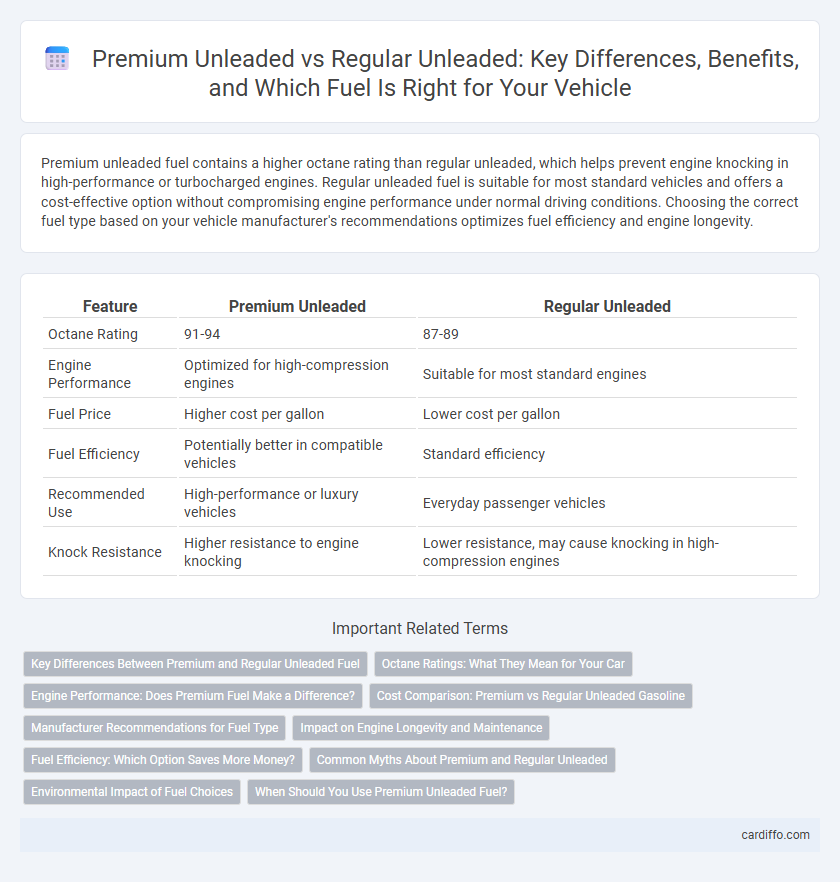Premium unleaded fuel contains a higher octane rating than regular unleaded, which helps prevent engine knocking in high-performance or turbocharged engines. Regular unleaded fuel is suitable for most standard vehicles and offers a cost-effective option without compromising engine performance under normal driving conditions. Choosing the correct fuel type based on your vehicle manufacturer's recommendations optimizes fuel efficiency and engine longevity.
Table of Comparison
| Feature | Premium Unleaded | Regular Unleaded |
|---|---|---|
| Octane Rating | 91-94 | 87-89 |
| Engine Performance | Optimized for high-compression engines | Suitable for most standard engines |
| Fuel Price | Higher cost per gallon | Lower cost per gallon |
| Fuel Efficiency | Potentially better in compatible vehicles | Standard efficiency |
| Recommended Use | High-performance or luxury vehicles | Everyday passenger vehicles |
| Knock Resistance | Higher resistance to engine knocking | Lower resistance, may cause knocking in high-compression engines |
Key Differences Between Premium and Regular Unleaded Fuel
Premium unleaded fuel contains a higher octane rating, typically 91-93, compared to regular unleaded's 87-89 octane, allowing it to resist engine knocking and improve performance in high-compression engines. Regular unleaded fuel is more cost-effective and suitable for most vehicles designed for standard octane levels, offering reliable efficiency without the added expense. The key differences impact engine longevity, fuel economy, and overall vehicle performance depending on manufacturer recommendations and specific engine requirements.
Octane Ratings: What They Mean for Your Car
Premium unleaded fuel typically has an octane rating of 91 or higher, while regular unleaded ranges from 87 to 89 octane. Higher octane ratings prevent engine knocking and optimize performance in vehicles with high-compression engines or turbochargers. Using the recommended octane rating ensures efficient combustion, better fuel economy, and protects engine components from damage caused by premature ignition.
Engine Performance: Does Premium Fuel Make a Difference?
Premium unleaded fuel has a higher octane rating than regular unleaded, which prevents engine knocking and allows engines with high compression ratios to operate optimally. Vehicles designed for premium fuel often experience improved acceleration, smoother performance, and enhanced fuel efficiency when using premium unleaded. Using premium fuel in engines calibrated for regular unleaded usually offers no noticeable performance benefits.
Cost Comparison: Premium vs Regular Unleaded Gasoline
Premium unleaded gasoline typically costs 20-50 cents more per gallon than regular unleaded due to higher octane ratings and refining costs. While premium fuel offers enhanced engine performance and knock resistance, most standard vehicles do not require it, making regular unleaded the more cost-effective choice for everyday driving. Consumers should evaluate their vehicle's manufacturer recommendations to determine if the extra expense of premium fuel delivers a tangible benefit.
Manufacturer Recommendations for Fuel Type
Manufacturers specify premium unleaded fuel for engines with high compression ratios or forced induction systems to prevent knocking and ensure optimal performance. Using regular unleaded in vehicles designed for premium may lead to reduced efficiency and potential engine damage over time. Always consult the vehicle's owner manual for the recommended fuel type to maintain warranty coverage and maximize engine longevity.
Impact on Engine Longevity and Maintenance
Premium unleaded fuel, with its higher octane rating, reduces engine knocking and promotes smoother combustion, which can enhance engine longevity in high-performance vehicles designed for such fuel. Regular unleaded fuel, while suitable for most standard engines, may cause premature wear and increased carbon deposits when used in engines requiring higher octane levels, leading to more frequent maintenance. Consistent use of the correct fuel type according to manufacturer specifications optimizes engine performance and minimizes costly repairs over time.
Fuel Efficiency: Which Option Saves More Money?
Premium unleaded fuel contains higher octane levels than regular unleaded, allowing engines designed for premium fuel to operate more efficiently and potentially improve fuel economy by up to 4-5%. However, most vehicles optimized for regular unleaded fuel do not realize significant fuel efficiency gains from premium, making regular unleaded the more cost-effective choice for these engines. Evaluating the manufacturer's fuel recommendation and real-world mileage performance data is essential to determine which fuel option delivers greater savings on fuel expenses.
Common Myths About Premium and Regular Unleaded
Premium unleaded fuel is often mistakenly believed to improve engine performance or fuel efficiency in vehicles designed for regular unleaded, but most engines calibrated for regular fuel see no tangible benefit from premium grades. Myths claim that premium fuel cleans engines better or lasts longer in storage; however, both fuel types contain similar additives for combustion stability and storage life. Using premium fuel in an engine that does not require it offers no cost-effective advantages and may result in unnecessary expenses without performance enhancement.
Environmental Impact of Fuel Choices
Premium unleaded fuel typically contains higher octane levels, reducing engine knocking and improving efficiency in high-performance vehicles, which can lead to slightly lower emissions compared to regular unleaded. Regular unleaded fuel, while more widely used and affordable, may produce higher levels of pollutants such as carbon monoxide and nitrogen oxides, contributing to air pollution and environmental degradation. Choosing fuel with cleaner formulations or alternative options like ethanol blends can further minimize greenhouse gas emissions and support sustainable environmental outcomes.
When Should You Use Premium Unleaded Fuel?
Premium unleaded fuel offers a higher octane rating, typically 91 or above, compared to regular unleaded's 87 octane, which helps prevent engine knocking in high-performance or turbocharged engines. Use premium unleaded fuel when your vehicle manufacturer specifies it in the owner's manual to ensure optimal engine performance, fuel efficiency, and to avoid potential long-term engine damage. In standard engines designed for regular unleaded fuel, using premium rarely provides noticeable benefits and generally is not cost-effective.
Premium Unleaded vs Regular Unleaded Infographic

 cardiffo.com
cardiffo.com